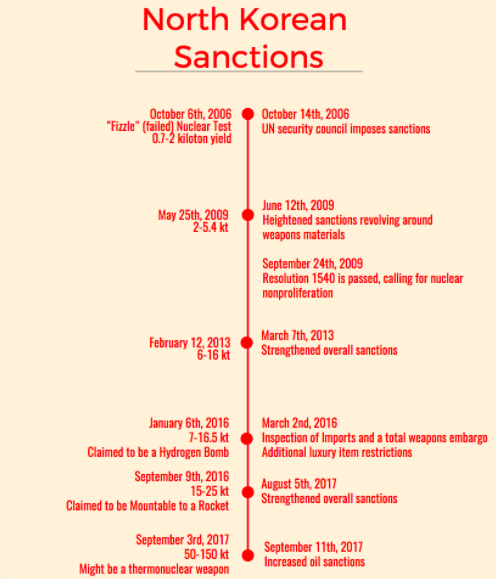U.N. places additional sanctions on North Korea after missile tests
October 12, 2017
In a strong voice of solidarity, the United Nations (UN) Security Council unanimously voted on Sept. 11 to impose a new set of sanctions against North Korea—nearly one week after the rogue nation carried out its sixth and largest nuclear test.
While not as hard-line as the initial U.S.-drafted resolution, the approved ratification achieved five key objectives: capping oil imports to North Korea, banning textile exports, suppressing smuggling efforts, forbidding nations from authorizing work permits for North Korean citizens and applying punitive measures to designated North Korean government entities.
This is the eighth and strongest set of measures imposed on North Korea by the UN since the country’s first nuclear tests in 2006. Prior UN resolutions have prohibited military supplies, luxury goods, metals and ore exports to North Korea and restricted foreign financial transactions and cargo shipments to and from the country.
Professor at the University of Vienna, Austria, Rudiger Frank, is a German economist and expert on North Korea’s economy and state-business relations in East Asia.
“Sanctions do have effects on North Korea, there is not doubt about that,” he said. “But they have neither achieved their stated goals—namely, prevent North Korea from developing nuclear weapons, nor their unstated goals—triggering a domestic revolution that would bring down the regime.”
As North Korea’s largest trading partner, China worked closely with the U.S. in negotiating the final language of the resolution.
Yet, upper school economics teacher Samuel Lepler believes that U.S. sanctions on North Korea can come in the form of punishing China for its trade with the country.
“Sometimes, sanctions are actually a punishment of anybody who does business with that country,” Lepler said. “So for example, China is North Korea’s largest trading partner, so sanctions on North Korea could come in the form of punishing China for trade.”
The sanctions significantly reduce access to vital energy materials and key sources of foreign currency. U.S. officials believe that with the new sanctions, there will be a 90 percent decrease in North Korean’s exports reported from 2016.
However, after hearing news of the sanctions, North Korea has warned that such pressures would only accelerate its nuclear weapons program, calling the sanctions “the most vicious, unethical and inhumane act of hostility.”
This latest flurry of political activity reflects the growing escalation of tension created by North Korea’s increasingly successful efforts in the development of its nuclear weapons program. According to the Japanese Defense Ministry, the nuclear test last month had an estimated yield of 160 kilotons—more than 10 times the size of the Hiroshima bond.
“The North Korean regime deserves our disgust over human rights violations and our anger over its Weapons of Mass Destruction program, no doubt about that,” Frank said. “But the people of North and South Korea also deserve a chance to survive. Risking a war is therefore irresponsible, and sanctions—which are warfare by economic means—will lead into that direction.”
This piece was originally published in the pages of the Winged Post on October 12, 2017.


















![“[Building nerf blasters] became this outlet of creativity for me that hasn't been matched by anything else. The process [of] making a build complete to your desire is such a painstakingly difficult process, but I've had to learn from [the skills needed from] soldering to proper painting. There's so many different options for everything, if you think about it, it exists. The best part is [that] if it doesn't exist, you can build it yourself," Ishaan Parate said.](https://harkeraquila.com/wp-content/uploads/2022/08/DSC_8149-900x604.jpg)




![“When I came into high school, I was ready to be a follower. But DECA was a game changer for me. It helped me overcome my fear of public speaking, and it's played such a major role in who I've become today. To be able to successfully lead a chapter of 150 students, an officer team and be one of the upperclassmen I once really admired is something I'm [really] proud of,” Anvitha Tummala ('21) said.](https://harkeraquila.com/wp-content/uploads/2021/07/Screen-Shot-2021-07-25-at-9.50.05-AM-900x594.png)







![“I think getting up in the morning and having a sense of purpose [is exciting]. I think without a certain amount of drive, life is kind of obsolete and mundane, and I think having that every single day is what makes each day unique and kind of makes life exciting,” Neymika Jain (12) said.](https://harkeraquila.com/wp-content/uploads/2017/06/Screen-Shot-2017-06-03-at-4.54.16-PM.png)








![“My slogan is ‘slow feet, don’t eat, and I’m hungry.’ You need to run fast to get where you are–you aren't going to get those championships if you aren't fast,” Angel Cervantes (12) said. “I want to do well in school on my tests and in track and win championships for my team. I live by that, [and] I can do that anywhere: in the classroom or on the field.”](https://harkeraquila.com/wp-content/uploads/2018/06/DSC5146-900x601.jpg)
![“[Volleyball has] taught me how to fall correctly, and another thing it taught is that you don’t have to be the best at something to be good at it. If you just hit the ball in a smart way, then it still scores points and you’re good at it. You could be a background player and still make a much bigger impact on the team than you would think,” Anya Gert (’20) said.](https://harkeraquila.com/wp-content/uploads/2020/06/AnnaGert_JinTuan_HoHPhotoEdited-600x900.jpeg)

![“I'm not nearly there yet, but [my confidence has] definitely been getting better since I was pretty shy and timid coming into Harker my freshman year. I know that there's a lot of people that are really confident in what they do, and I really admire them. Everyone's so driven and that has really pushed me to kind of try to find my own place in high school and be more confident,” Alyssa Huang (’20) said.](https://harkeraquila.com/wp-content/uploads/2020/06/AlyssaHuang_EmilyChen_HoHPhoto-900x749.jpeg)










